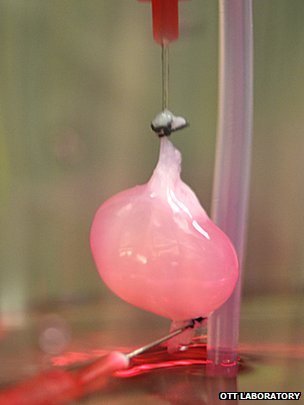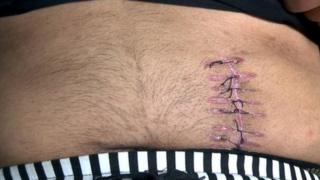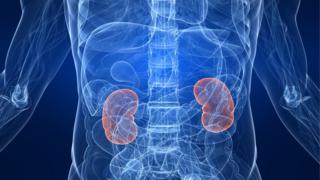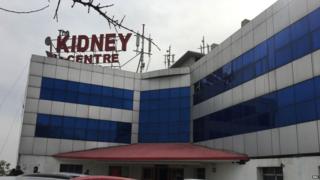Navigation
Install the app
How to install the app on iOS
Follow along with the video below to see how to install our site as a web app on your home screen.

Note: This feature currently requires accessing the site using the built-in Safari browser.
More options
You are using an out of date browser. It may not display this or other websites correctly.
You should upgrade or use an alternative browser.
You should upgrade or use an alternative browser.
Teenager sells kidney for ipad2
- Thread starter JBeukema
- Start date
Cal
Since 2010
Wtf is wrong with people..  .
.
Mr. H.
Diamond Member
There's an app for that.
An excellent choice.
Granny says, "Dat's right - now dey can grow a kidney inna lab'ratory...

Scientists make 'laboratory-grown' kidney
14 April 2013 - A kidney "grown" in the laboratory has been transplanted into animals where it started to produce urine, US scientists say.
Scientists make 'laboratory-grown' kidney
14 April 2013 - A kidney "grown" in the laboratory has been transplanted into animals where it started to produce urine, US scientists say.
Similar techniques to make simple body parts have already been used in patients, but the kidney is one of the most complicated organs made so far. A study, in the journal Nature Medicine, showed the engineered kidneys were less effective than natural ones. But regenerative medicine researchers said the field had huge promise. Kidneys filter the blood to remove waste and excess water. They are also the most in-demand organ for transplant, with long waiting lists.

The rat kidney was grown in the laboratory
The researchers' vision is to take an old kidney and strip it of all its old cells to leave a honeycomb-like scaffold. The kidney would then be rebuilt with cells taken from the patient. This would have two major advantages over current organ transplants. The tissue would match the patient, so they would not need a lifetime of drugs to suppress the immune system to prevent rejection. It would also vastly increase the number of organs available for transplant. Most organs which are offered are rejected, but they could be used as templates for new ones.
Scaffolding
Researchers at Massachusetts General Hospital have taken the first steps towards creating usable engineered kidneys. They took a rat kidney and used a detergent to wash away the old cells. The remaining web of proteins, or scaffold, looks just like a kidney, including an intricate network of blood vessels and drainage pipes. This protein plumbing was used to pump the right cells to the right part of the kidney, where they joined with the scaffold to rebuild the organ. It was kept in a special oven to mimic the conditions in a rat's body for the next 12 days. When the kidneys were tested in the laboratory, urine production reached 23% of natural ones.
The team then tried transplanting an organ into a rat. Once inside the body, the kidney's effectiveness fell to 5%. Yet the lead researcher, Dr Harald Ott, told the BBC that restoring a small fraction of normal function could be enough: "If you're on haemodialysis then kidney function of 10% to 15% would already make you independent of haemodialysis. It's not that we have to go all the way." He said the potential was huge: "If you think about the United States alone, there's 100,000 patients currently waiting for kidney transplants and there's only around 18,000 transplants done a year. "I think the potential clinical impact of a successful treatment would be enormous."
'Really impressive'
Donor death causes suspension of kidney transplants at UCSF Medical Center...
San Francisco hospital suspends kidney donations after death
20 Dec.`15 — UCSF Medical Center has voluntarily suspended its living donor program for kidney transplants after a living donor died last month.
San Francisco hospital suspends kidney donations after death
20 Dec.`15 — UCSF Medical Center has voluntarily suspended its living donor program for kidney transplants after a living donor died last month.
The donor had provided a kidney to a recipient at UCSF Medical center in October. Hospital and regulatory officials are still investigating the cause of death, the San Francisco Chronicle reported Saturday (Kidney donor’s death a ‘nightmare scenario’ for UCSF program ). Dr. Steven Katznelson, medical director of California Pacific Medical Center's kidney transplantation program in San Francisco, called the donor's death a "nightmare scenario." "We worry about it every day," he said. "For a healthy person who goes under general anesthesia, there's always a risk."
UCSF officials said the recipient's new kidney is working properly but they declined to identify the patient or the deceased donor. They wouldn't discuss the case further. Most kidney transplant recipients receive kidneys from deceased donors, but those received from living donors generally have better outcomes. The risk of a kidney donor death following surgery is about three deaths in every 10,000 cases. Four kidney donor deaths, including the one at UCSF, have been reported since 2014, according to the Organ Procurement and Transplant Network, which runs the United Network for Organ Sharing waiting list and oversees transplantation nationwide.
Hospital officials say UCSF has performed more kidney transplants overall than any other center in the country, with more than 10,000 since 1964. Doctors there performs about 350 kidney transplants a year, with about 150 involving living donors. UCSF says that during the investigation it will not conduct the transplant surgeries on donors but it will continue transplanting kidneys from both living and deceased donors into recipients. Physicians at California Pacific will take over the donor side for several transplant surgeries that are scheduled at UCSF before the new year. "Our goal is to help (UCSF and its patients) as much as we can," Katznelson said.
San Francisco hospital suspends kidney donations after death
Kidney transplant racket at top Delhi hospital in India...

Kidney racket at top Delhi hospital
Sat, 04 Jun 2016 - Indian police say they have uncovered an illegal trade in human kidneys in one of the leading private hospitals in the capital, Delhi.
Kidney racket at top Delhi hospital
Sat, 04 Jun 2016 - Indian police say they have uncovered an illegal trade in human kidneys in one of the leading private hospitals in the capital, Delhi.
They say five people have been arrested so far, including two employees of the Apollo Hospital. They are suspected of luring poor people to sell their kidneys for up to $7,500 (£5,170) before re-selling the organs for huge profits.

Stitches of man who sold his kidney
The hospital says it has been a victim and doctors were misled. It is believed that the suspected gang members forged papers to dupe doctors into operating on the needy people in the belief that they were donating the kidneys to their relatives.
The Apollo Hospital has said it is a matter of "grave concern", adding that it is fully co-operating with the police. "The hospital has been a victim of a well-orchestrated operation to cheat patients and the hospital," an Apollo spokesman said. "We urge the police to take the strictest of action against all those involved," the spokesman added. A chronic shortage of transplant organs is fuelling a lucrative black market trade in body parts across India.
Kidney racket at top Delhi hospital - BBC News
The "Global Times"?
China crackin' down on black market organ harvesting...

China court jails 16 for black market kidney trading
Sat, 31 Dec 2016 - A Chinese court jails 16 people for involvement in illegal kidney transplants, state media report.
China court jails 16 for black market kidney trading
Sat, 31 Dec 2016 - A Chinese court jails 16 people for involvement in illegal kidney transplants, state media report.
Sixteen people in China have been jailed for up to five years each for involvement in illegal kidney transplants, state media report. A local court said the defendants - mainly health professionals - had used the internet to match buyers and sellers, Xinhua news agency said. Among them were two doctors, a nurse and an anaesthetist who the court said carried out secret transplant surgery. A shortage of donors has led to a booming black market for organs.

The Lixia district court in Jinan city in China's Shandong province said patients were asked to pay at least $57,000 (400,000 yuan). For many years, China harvested the organs of executed prisoners to help meet demand. But following international condemnation, Beijing says it ended the practice at the start of 2015. The government has had some success in registering new legal donors, but there are still many people waiting for transplants.
The country's donor rates are among the lowest in the world - 0.6 donations per million people compared with 37 per million in Spain. Many Chinese believe the body is sacred and should be buried intact in a show of respect to their ancestors. Trading in human organs has been banned in China since 2007.
China court jails 16 for black market kidney trading - BBC News
Organ trafficking ring busted in Pakistan...
Pakistani police rescue 24 from organ trafficking gang
Tue, 24 Jan 2017 - Alert raised after patients from UK, Canada and Australia develop complications following kidney transplants.
Pakistani police rescue 24 from organ trafficking gang
Tue, 24 Jan 2017 - Alert raised after patients from UK, Canada and Australia develop complications following kidney transplants.
http://www.bbc.co.uk/news/health-38722052"We will remove your kidney, and you will receive 300,000 rupees [£2,300]." Sadi Ahmed was held hostage for three months by an organ trafficking gang. In October last year, he was one of 24 people rescued by police in Rawalpindi, Pakistan. They had been imprisoned in a building in an affluent suburb, awaiting the forced removal of their kidneys. Three people are due in court later this month. They deny all involvement in illegal transplants and trafficking.
Police say victims were lured to Rawalpindi in the hope of getting jobs. They even were tricked into going to court, under the pretence of getting them documentation to work. In fact, the gang was creating a paper trail to provide a cover story. Their victims were held captive, for months in some cases. Mr Ahmed told the BBC's File on 4 programme that he was taken to a commercial building, had his phone taken from him, and soon realised there was no job. "There were 20 to 25 other persons sitting. I was told to shut up and be quiet and sit there. "About 10 minutes later, the agent arrived and said get ready as I was going in for a test. "I asked, 'What type of a test are you taking me for? What type of work are you offering?'."

The Kidney Centre Hospital in Rawalpindi
The traffickers wanted to test his kidney, and told him he would be given the equivalent of £2,300 for the organ. Mr Ahmed says he was "beaten up, not allowed to go out, we were padlocked in". "We were threatened that the police would beat us up and we would be killed." When police raided the building, Mr Ahmed was saved just in time. He was due to have his kidney removed at a nearby hospital, called the Kidney Centre, a few hours later. Though happy to be free, while he was held captive his wife and four children struggled to survive without him, and built up debts. He said: "I had my own property, it was taken away due to the debts. We are penniless now. We have lost our home."
Police officer Yasir Mehmood says the victims were "very weak and very sad" when he and his colleagues found them, locked behind a grille. Dr Mirza Naqi Zafar, general secretary of the Pakistan Transplantation Society, says despite a ban on commercial transplants in 2010, there has been a resurgence in the illegal trade in recent years, with as many as 100 illegal transplants happening every month.
Transplant tourism
AvgGuyIA
Gold Member
This must be a back street Doctor doing the operation, no self-respecting Doctor would remove a healthy organ for that reason.
Similar threads
- Replies
- 69
- Views
- 1K
- Replies
- 91
- Views
- 1K
- Replies
- 5
- Views
- 183
- Replies
- 72
- Views
- 1K
Latest Discussions
- Replies
- 2
- Views
- 3
- Replies
- 48
- Views
- 162
- Replies
- 11
- Views
- 175
Forum List
-
-
-
-
-
Political Satire 8050
-
-
-
-
-
-
-
-
-
-
-
-
-
-
-
-
-
-
-
ObamaCare 781
-
-
-
-
-
-
-
-
-
-
-
Member Usernotes 469
-
-
-
-
-
-
-
-
-
-

